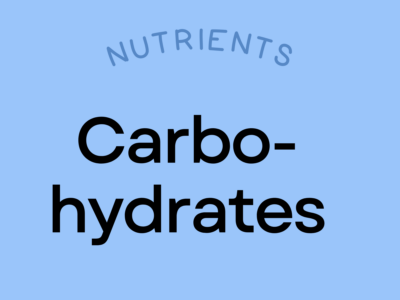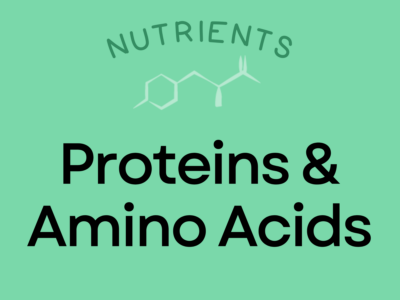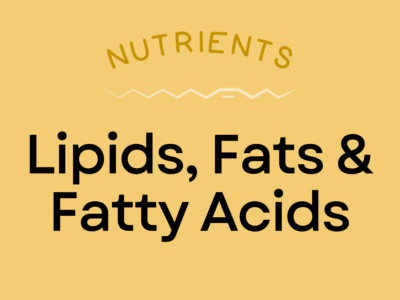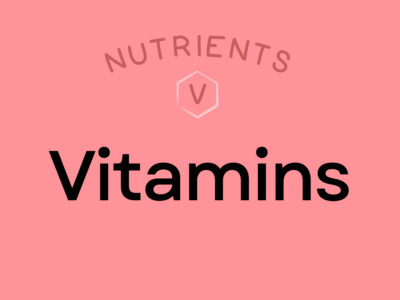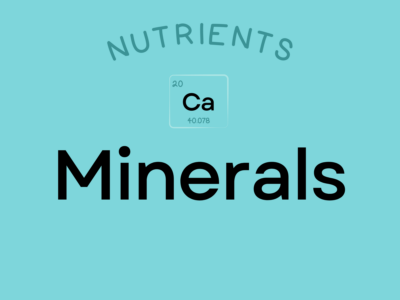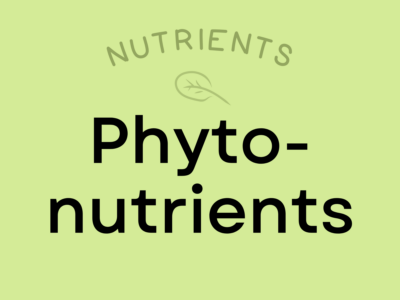Nutrivore
no͝ o-trĭ-vôr’
noun
- A person who chooses foods to supply all the nutrients their body needs to thrive.
- A diet predominantly comprised of nutrient-dense whole foods.
- A radical yet simple idea: Get all the nutrients we need from the food we eat.
Nutrivore represents a completely new way to think about foods. Instead of labeling foods as “good” or “bad”, we look at the overall quality of the whole diet, choosing foods such that the sum total of all the nutrients those foods contain throughout the day add up to meet the daily demands of our body.
Table of Contents[Hide][Show]
What Is Nutrivore?
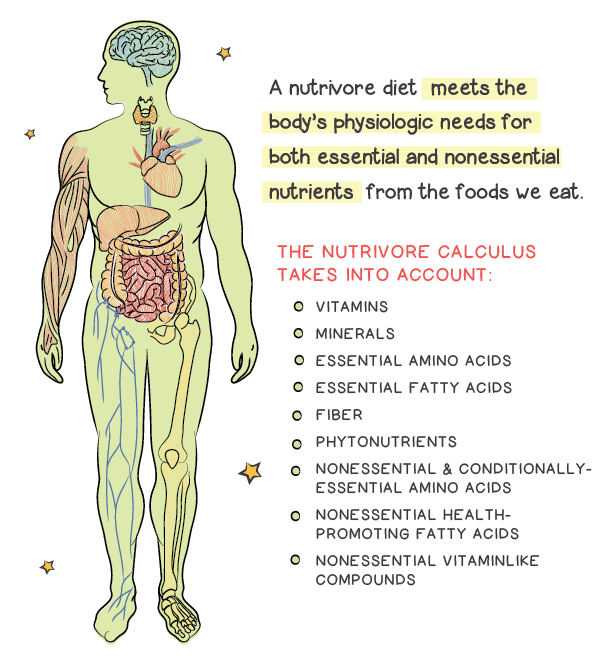
The goal of a Nutrivore diet is to fully meet the body’s physiologic needs for both essential and nonessential nutrients from the foods we eat, also called nutrient sufficiency, but without consuming excess energy (i.e., staying within daily caloric requirements).
Being a Nutrivore is about the overall quality of the whole diet, and not about a list of yes-foods and no-foods.
The Nutrivore calculus takes into account the full cadre of nutrients, including essential nutrients—vitamins, minerals, essential amino acids, and essential fatty acids—in addition to fiber, phytonutrients, nonessential and conditionally-essential amino acids, nonessential health-promoting fatty acids, and nonessential vitaminlike compounds. This ensures both nutrient synergy as well as prioritizing the full complement of nutrients our bodies need to thrive.
Being a Nutrivore is about the overall quality of the whole diet, and not about a list of yes-foods and no-foods. Even though eliminating empty calorie foods helps to achieve nutrient sufficiency without overeating, no food is strictly off-limits. In this way, Nutrivore is a diet modifier rather than a diet itself—a nutrivorous approach can be layered atop of other dietary structures and priorities in order to meet an individual’s specific health needs and goals.
What Is Nutrivore?
Nutrivore is a revolutionary approach to nutrition that redefines healthy eating by focusing on nutrient sufficiency (i.e., meeting our daily needs for essential nutrients) rather than restrictions. Unlike traditional diets that classify foods as “good” or “bad,” Nutrivore emphasizes the nutritional value each food brings to the table, encouraging a balanced, varied diet that’s adaptable to individual preferences and lifestyles.
By prioritizing nutrient-dense foods, Nutrivore empowers people to meet their bodies’ needs for vitamins, minerals, and other essential nutrients without compromising on enjoyment or satisfaction. Flexible and inclusive, Nutrivore integrates practical tools like the Nutrivore Score and Weekly Serving Matrix to make nutrient-rich eating easy and sustainable. This philosophy creates room for quality-of-life foods, making it a fulfilling and realistic way to support long-term health and well-being.
Why Nutrivore Is So Important
Micronutrient deficiency is increasingly showing up as a major underlying driver of chronic disease. Many of us think that nutrient deficiencies are mainly a problem in developing nations (whereas in Westernized countries like the United States, our problem is that we have too much food!), but this is a misconception. The typical Western Diet is definitely energy-rich, but it’s also nutrient-poor: the types of food that many people eat each day are what are called ultra-processed foods. These are foods made mostly from ingredients extracted from foods—such as vegetable oils, corn starch, high-fructose corn syrup, and table sugar—and contain low amounts of the vitamins and minerals (and other health-promoting compounds) found in whole foods. The result is a high prevalence of nutrient deficiency right in our own backyard.
In fact, micronutrient deficiencies are so common that some researchers speculate that at least 90% of us of us are deficient in at least one vital nutrient.
The Prevalence of Nutrient Deficiencies and Insufficiencies
Almost everyone has dietary shortfalls of essential nutrients, which increases risk for chronic disease, including type 2 diabetes, cancer, cardiovascular disease, asthma, chronic kidney disease, neurodegenerative diseases like Alzheimer’s disease, and infection.
In addition, about one third of Americans are at risk of nutrient deficiency, resulting in diseases of malnutrition like anemia, scurvy, rickets and night blindness.
The Causes of Nutrient Deficiencies
Why do almost all of our diets fall short of meeting our body’s nutritional needs? The complex reasons include: ultra-processed and hyperpalatable foods displacing more nutritionally valuable options; dietary guidelines historically focusing on nutritionally underwhelming foods; and, weight-loss and fad diets propelling diet myths, healthism, and restrictive eating patterns. Basically, it’s harder than ever to choose healthy foods, and most people are confused about which foods those even are.
Nutrient Deficiencies in Popular Diets
Understanding the nutrient insufficiencies commonly associated with popular diets is essential for adopting the Nutrivore philosophy, with informed decision-making and by taking proactive measures to maintain optimal nutrition within your chosen eating plan. From vegan and vegetarian diets to low-carb, low-fat, gluten-free, paleo, primal, and ketogenic diets, each dietary approach presents unique challenges in meeting essential nutrient needs. By delving into the specifics of each diet and identifying potential deficiencies, you will gain a deeper understanding of the nutrients that require special attention.
What does the high prevalence of micronutrient deficiencies mean for human health? The news isn’t good! While diseases of deficiency like scurvy and pellagra are rare in Western countries, more complex collections of nutrient insufficiencies and deficiencies are linked to increased risk for chronic diseases.
The Link Between Nutrients and Disease Risk
What does the high prevalence of micronutrient deficiencies mean for human health? The news isn’t good! While diseases of deficiency like scurvy and pellagra are rare in Western countries, more complex collections of nutrient insufficiencies and deficiencies are linked to increased risk for chronic diseases.
Studies also show that increasing our nutrient intake can improve our health is a whole host of ways! This is because each biological system within the human body requires a collection of nutrients to function properly. When we supply ample of those nutrients, we generally improve the health of the biological systems that require them.
Everything You Need to Jump into Nutrivore TODAY!
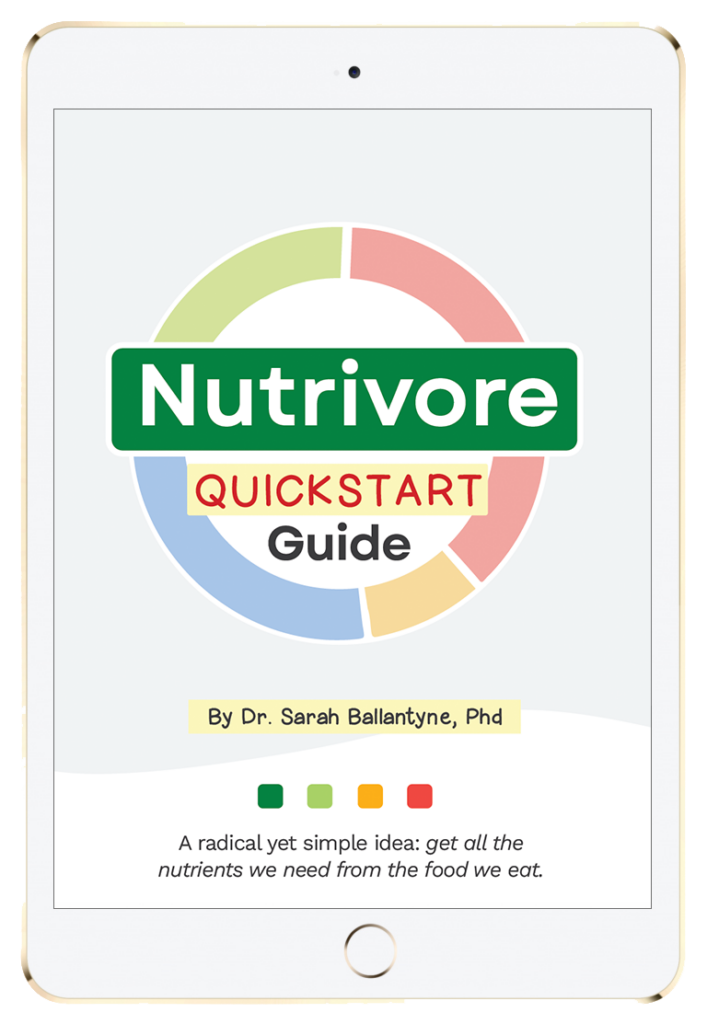
Nutrivore Quickstart Guide
The Nutrivore Quickstart Guide e-book explains why and how to eat a Nutrivore diet, introduces the Nutrivore Score, gives a comprehensive tour of the full range of essential and important nutrients!
Plus, you’ll find the Top 100 Nutrivore Score Foods, analysis of food groups, practical tips to increase the nutrient density of your diet, and look-up tables for the Nutrivore Score of over 700 foods.
Buy now for instant digital access.
It’s Best to Get Nutrients from Food
However, studies show that it’s important to get these nutrients from the foods we eat, and that we don’t get the same benefit when those nutrients come from multivitamin and multimineral supplements.
Why Ditch the Multivitamin
Why not simply reach for a multivitamin to supply the essential nutrients lacking in most diets? The concept of a multivitamin as nutritional insurance has been busted by the scientific literature. In fact, meta-analyses demonstrate that taking a daily multivitamin has absolutely no effect on all-cause mortality, a general marker of health and longevity, nor cardiovascular disease incidence and mortality, nor cancer prevention.
An important 2019 study compared the health impact of nutrients from foods versus supplements. This study revealed that consuming sufficient vitamin A, vitamin K, magnesium, zinc and copper from food—but not from supplements—reduced all-cause mortality and mortality associated with cardiovascular disease. Furthermore, excess calcium from supplements—but not from food—increased risk of mortality from cancer. This study reinforces the importance of achieving nutrient sufficiency from food and even highlights some potential harmful effects from supplementation.
Supplemental calcium is also associated with calcium oxalate kidney stones; and, elevated serum levels of folic acid (a common form of vitamin B9 found in supplements) has been associated with increased cancer risk and can mask vitamin B12 deficiency.
Becoming Nutrient Aware
The most important first step to becoming a Nutrivore is developing an appreciation for nutrients, what they do in our bodies, what happens when we don’t get enough of them, and which foods are the best sources. This is what we term nutrient awareness.
Nutrients
Understanding nutrients is at the heart of the Nutrivore approach, helping you make empowered, nourishing food choices. Nutrients fuel every function in our bodies, from boosting energy to supporting immune health and cognitive function. By learning about the role nutrients play in our well-being and discovering which foods are richest in essential vitamins, minerals, and other beneficial compounds, you can unlock a deeper level of nourishment in your everyday meals. Nutrient awareness opens up a world of vibrant, nutrient-rich foods that each bring something unique to the table—allowing you to build a balanced, Nutrivore-inspired diet that fully supports your health while still enjoying the foods you love. Dive in and discover how to make nutrient-dense choices that work for you, one meal at a time.
Nutrient Daily Values
Nutrition requirements and recommended nutrient intake for infants, children, adolescents, adults, mature adults, and pregnant and lactating individuals.
Diet culture has led many people to develop encyclopedic knowledge of the calories, carb grams and fat grams per serving of foods; but with Nutrivore, we’re looking to understand much more meaningful nutritional information while embracing a less calculated and rigid way to choose foods. With Nutrivore, you generally don’t need to count, measure, weigh or log your foods, but can instead use your nutrient awareness to choose nutritionally-complementary and health-promoting foods more often, use rough estimates for serving guides, and diversify your diet by leaning into novelty and new food experiences.
Learn More About Nutrients
Nutrients are broadly categorized by their chemical structure and biological activity.
Want to know the top 25 foods for this awesome nutrient?

The Top 25 Foods for Every Nutrient
The Top 25 Foods for Every Nutrient e-book is a well-organized, easy-to-use, grocery store-friendly guide to help you choose foods that fit your needs of 43 important nutrients while creating a balanced nutrient-dense diet.
Get two “Top 25” food lists for each nutrient, plus you’ll find RDA charts for everyone, informative visuals, fun facts, serving sizes and the 58 foods that are Nutrient Super Stars!
Buy now for instant digital access.
The Nutrivore Score
The term nutrient density refers to the concentration of nutrients (mainly vitamins and minerals, but also protein, fiber, phytonutrients, and other micronutrients) per calorie of food. High nutrient-density foods supply a wide range of nutrients (or alternatively, high levels of a specific, important nutrient) relative to the calories they contain. The Nutrivore Score system is a comprehensive method to quantify the nutrient-density of foods and make the nutritional evaluation of foods objective. The Nutrivore Score is a tool to identify the most nutrient-dense options within every food group and subgroup, to inform your day-to-day choices.
The Nutrivore Score
The Nutrivore Score is a comprehensive tool for assessing nutrient density, helping you make nutrient-rich choices by highlighting the amount of essential nutrients per calorie in foods. The Nutrivore Score supports balanced eating by encouraging comparisons within food groups, practical swaps, and easy nutrient-boosting additions. With a flexible approach that avoids moralizing food, the Nutrivore Score and related resources empower individuals to enhance their diet quality, improve nutrient intake, and support long-term health, all while embracing variety and enjoyment.
It is time for a positive approach to dietary guidance using nutrient density as a basic principle. The Nutrivore Score is a necessary foundational step towards achieving this goal! By understanding the nutrients per calorie offered by individual foods via the Nutrivore Score, in addition to recognition that certain nutrients are exclusive to specific food groups, we can achieve nutrient sufficiency by choosing a variety of nutrient-dense superfoods as well as the highest Nutrivore Score options from the various foundational food families.
Look Up Nutrivore Scores
Nutrivore Score Search
Look up the Nutrivore Score of any food in the database of 8,000 foods.
What Does a Nutrivore Diet Look Like?
The concept of Nutrivore is very simple: Choose foods such that the total of all the nutrients contained within those foods adds up to meet or exceed our daily requirements for the full complement of essential and nonessential (but still very important) nutrients, while also staying within our caloric requirements. The easiest way to do this is to have the foundation of the diet be a wide variety of nutrient-dense whole and minimally-processed foods including selections from all of the nutritionally distinct food families.
Foundational Foods
Nutrivore Foundational Foods are the nutrient powerhouses that form the backbone of a nourishing, balanced diet. These foods—like leafy greens, berries, seafood, legumes, and nuts—are packed with vitamins, minerals, fiber, healthy fats, and phytonutrients that support long-term health and vitality. By incorporating a variety of these foods regularly, and following the flexible serving targets outlined here, you can more easily meet your body’s nutritional needs while enjoying delicious, satisfying meals. Nutrivore Foundational Foods make it simple to focus on what to add to your plate, allowing plenty of room for enjoyment and flexibility in your diet. Discover the foods that can transform your approach to eating and support optimal wellness every day.
Below you’ll find the more important concepts to implement a Nutrivore diet.
Easily track your servings of Nutrivore Foundational Foods!
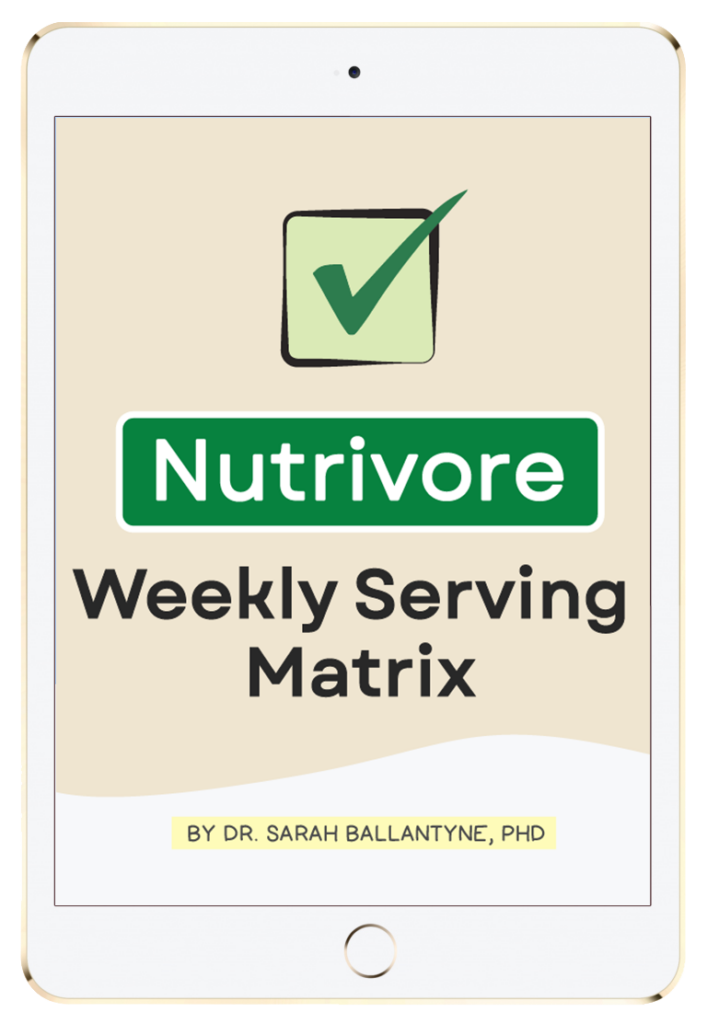
The Nutrivore Weekly Serving Matrix
The Nutrivore Weekly Serving Matrix digital resource is an easy-to-use and flexible weekly checklist designed to help you maximize nutrient-density and meet serving suggestions of Nutrivore foundational foods, all without having to weigh or measure your foods!
Includes a 22-page instructional guide and downloadable interactive guides.
Buy now for instant digital access.
Nutrivore Is a Diet Modifier
Nutrivore is not a diet itself, but rather a food philosophy or a diet modifier. By deepening your understanding of what nutrients do in the body and which foods supply them, you can apply Nutrivore principles atop other dietary structures, anti-diet like intuitive eating, or no dietary structure in particular, thereby increasing your consumption of vital nutrients that are essential for your health.
You can increase the nutrient-density of your current diet by applying Nutrivore principles and overlaying an emphasis on nutrient-sufficiency overtop of the core dietary structure.
There’s myriad combinations of foods we can eat in a day that will supply the full complement of nutrients that our bodies need to thrive, but this does require nutrient awareness. So, while the concept of Nutrivore is straightforward, its successful practice requires both:
- unlearning many pervasive diet myths; and
- learning from a fresh perspective the inherent nutritional value of foods.
The goal is to help you understand the importance of specific nutrients and what foods supply those nutrients, as well as which foods are most strongly associated with better health outcomes, all outside of any specific dietary framework. In short, you’ll learn why Nutrivore is so important, and how to apply Nutrivore principles to your current diet.
Various diets billed for health and/or weight loss success have exacerbated the nutrient deficiency problem either through a lack of a nutrient focus and education or by omitting groups of nutritious whole foods, in some cases eliminating all food sources of certain nutrients. In fact, these diets focus on just about everything but nutrients, especially micronutrients but also nonessential (but super important) nutrients, representing a fundamental flaw in each dietary rationale. Instead, these popular diet plans teach an oversimplification of nutritional sciences or even a complete disregard for all scientific research that doesn’t conform to a diet’s preconceived notions. The result is that these popular diets purported to improve health or facilitate weight loss all fall short of the mark because nutritional deficiencies linked with increased chronic disease risk are still common among adopters.
The good news is that you can increase the nutrient-density of your current diet by applying Nutrivore principles and overlaying an emphasis on nutrient-sufficiency overtop of the core dietary structure. By carefully selecting a wide variety of foods such that the body’s nutrient requirements are met by the diet, the most basic function of diet is achieved—nourishment!
Of course, some individuals may still need to eliminate foods due to sensitivities or allergies, or may choose to eliminate certain foods to conform to a specific dietary structure, but this in no way prevents us from achieving nutrient sufficiency, although it may necessitate thoughtful selection from the included foods. For those diets that eliminate all sources of specific nutrients—such as a carnivore diet, fruitarian diet, and some implementations of a ketogenic diet—a Nutrivore approach can still be used to improve the quality of the diet even if the ultimate goal of Nutrivore may be out of reach. In these cases, its additionally important to work with a nutritionist, registered dietitian, or your doctor to identify nutrient shortfalls and supplement accordingly.
There Are No Bad Foods on Nutrivore
There is no cusp above which a food is “good” and below which a food is “bad”. While any food with a Nutrivore Score over 150 contributes more nutrients than calories to the diet, there are plenty of examples of foods with lower scores that are still incredibly valuable sources of nutrients. For example, cheese has an average Nutrivore Score of 140 but is also the most concentrated food source of calcium. Instead, all foods lie on a spectrum of nutrient density, and the Nutrivore Score is but one tool to help identify the best options within highly-related foods, and reinforce the value of whole foods.
Studies have shown that dichotomous approaches to diet, i.e., diets defined by a yes-list and no-list (or variations such as red-light versus green-light foods, or high-points versus zero-points foods), increase the risks both of developing eating disorders and regaining lost weight. Furthermore, the popularity of diets that demonize specific foods while lionizing others propels classism in diet and health—food elitism increases the cost of healthy foods. A variety of studies have shown that greater income increases access to healthy foods, and income is but one social determinant of health.
The Nutrivore philosophy appreciates the inherent nutritional value of foods, without labeling any food as good or bad. By extension, no singular food choice is a bad one, and Nutrivore fully embraces treats, cultural foods, and food traditions, without derision. Not every food you eat needs to be the pinnacle of nutrient density—your diet can meet your nutritional needs while including some low nutrient-density, quality-of-life foods. Furthermore, there is no one perfect Nutrivore diet—there is a ton of flexibility of food choice that aligns with Nutrivore principles. And, Nutrivore celebrates every small step you take towards consuming a more nutrient-replete diet.
The Best Support to Build This Important Daily Habit!

Nutrivore Salad-a-Day Challenge
The Nutrivore Salad-a-Day Challenge e-book explains all the ways a daily salad can improve your health, plus includes a collection of 10 handy visual guides and food lists, like the Nutrivore Salad Matrix.
Plus, you’ll find 50+ recipes, including over 30 of our favorite salad recipes plus recipes for delicious dressings and tasty toppers.
Buy now for instant digital access.
Help me to keep building Nutrivore.com
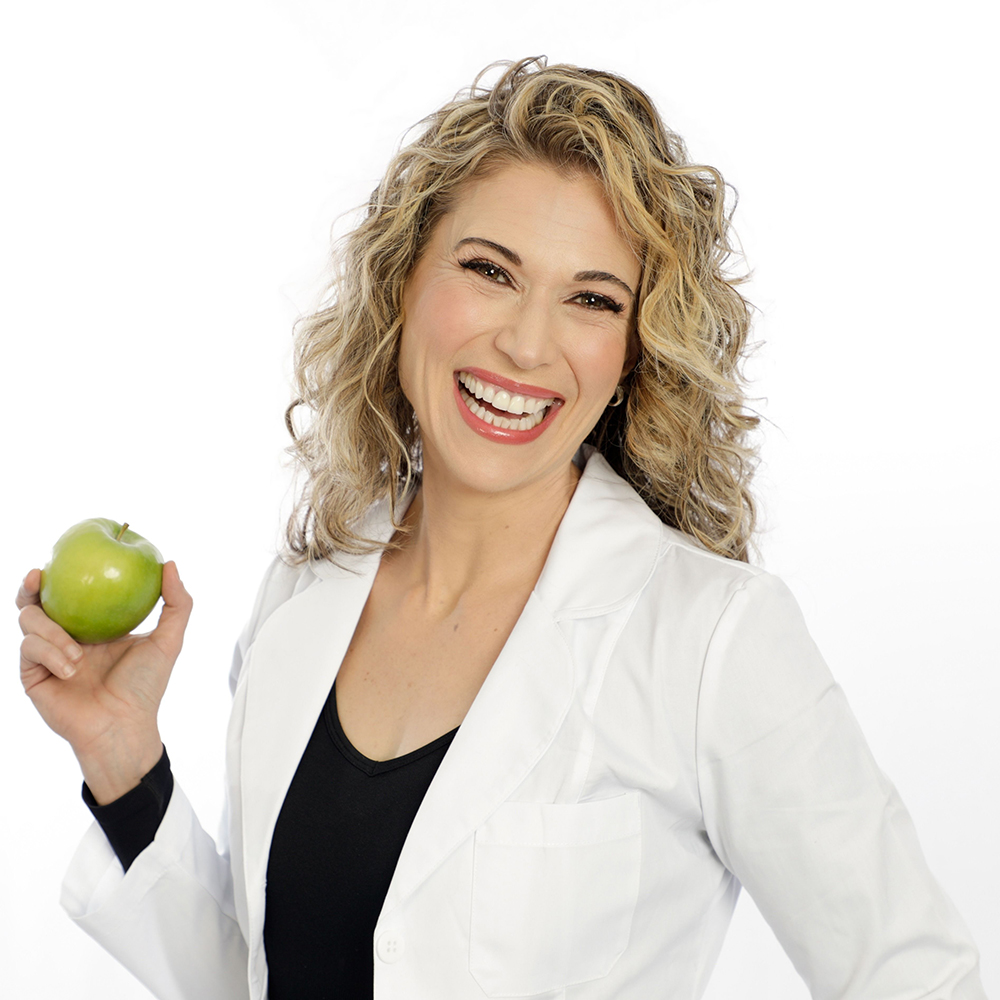
I’m working on writing more awesome articles on this topic to be featured right here on this webpage. If you’re enjoying the content my team and I have created thus far and would like to see more, you can support our efforts to keep building out this site by joining the Nutrivore community on Patreon!
Plus every month, you’ll gain exclusive and early access to a variety of resources, including a weekly video podcast, a new e-book in a series, nutrient fun factsheet, and more! Sign up now and also get 5 free Nutrivore guides as a welcome gift! Win-win-win!









